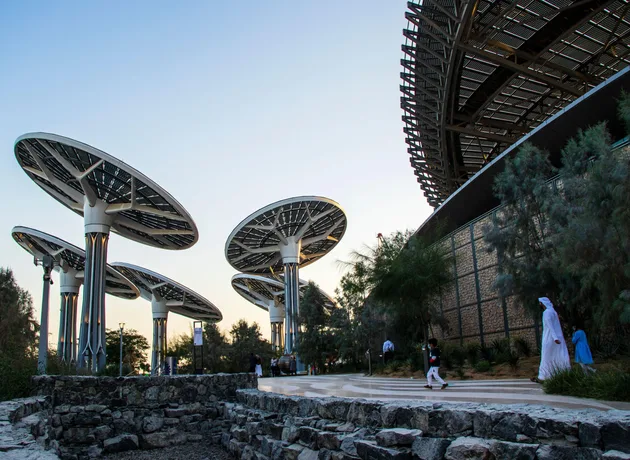Generation

UAE’s ambitious NDCs balanced by criticism over oil expansion

While the UAE’s commitment to a 47 percent reduction positions it as a regional leader in climate action, its concurrent expansion of oil and gas production remains a focal point of global scrutiny.
NDCs form the backbone of the Paris Agreement. They oblige countries to update emissions-reduction targets and measures to stay on track for the Paris goal of net zero emissions by 2050 and limiting global temperature rise to 1.5C. The agreement mandates that nations submit stronger NDCs every five years.
Kate Dourian, a non-resident fellow at the Arab Gulf States Institute in Washington, tells AGBI that the UAE was one of the first countries to submit its third NDCs.
Like most countries, other states in the Gulf have not yet submitted their updated NDCs, which are not due until February 2025.
Dourian says this signals a serious intent to decarbonise and address gaps identified during the global stocktake at last year’s Cop28 conference, which was hosted by the UAE: “No other Gulf state has submitted updated NDCs yet, and their targets remain less ambitious.”
The updated NDC increases the UAE’s previous target of a 23.5 percent reduction by 2030 and adopts 2019 as the baseline year for measuring emissions reductions.
Experts say the new framework provides a more transparent and ambitious structure for achieving climate goals.
Robin Mills, an energy analyst and AGBI columnist, says the UAE’s NDCs represent a higher level of ambition than the previous versions, with an implied more rapid pace of emissions reductions to 2035.
He says however, that while the power targets are achievable, goals in other sectors such as transport could have been more aggressive.
“The industrial sector is doable but depends on supportive policies, for example on carbon pricing, which still need to be introduced,” Mills says.
Hydrocarbon criticisms
Despite its ambitious targets, the UAE’s plans to expand production of fossil fuels have drawn sharp criticism from environmental advocates. They argue that such moves conflict with global efforts to limxzit warming to 1.5C and raise questions about the credibility of pledges.
“The UAE’s stated plans to expand its fossil fuel production are completely out of line with the scientific consensus that there can be no fossil fuel expansion if humanity is to limit warming to safe levels,” says Jess Beagley, policy lead at the Global Climate and Health Alliance.
Beagley also criticises the reliance on carbon capture and storage, describing it as a “dangerous distraction” that “while sounding promising, has consistently failed to deliver”.
She points to the “significant” health risks posed by climate change in the Gulf region, saying Gulf states face sea level rise, reduced rainfall, extreme heat and heatwaves, increases in dangerous dust storms, and frequent and more extreme storms.
“In an already hot, dry region, the added pressures produced by climate change pose a significant threat to the region’s population,” she says.
A report published last year by the International Monetary Fund claimed that “climate disasters” in the Middle East and Central Asia reduce annual economic growth on a per-capita basis by 1 to 2 percentage points.
In the UAE, despite the government spending billions on drainage, severe flooding has become a regular issue.
The UAE received the highest score among Gulf nations in the Healthy NDC Scorecard, earning 10 out of 18 points for integrating health considerations into its climate plans.
But Beagley warns, “No amount of healthcare adaptation will protect people if warming continues to rise … The UAE’s commitments must include deeper cuts to emissions.”
However, Noam Raydan, a senior fellow at The Washington Institute for Near East Policy, emphasises the demand-driven nature of oil production.
“Each country has its own political, economic, and social circumstances,” she says.
“These dictate how it forms its policies, including energy transition policies. Oil and gas producers in the Middle East, mainly in the Gulf region, have faced criticisms due to their commitment to fossil fuel investments.
“While environmental concerns are certainly valid amid the climate crisis, those who blame the industry, in general, for climate change ignore one fact: the industry is responding to demand for oil and gas.
“As long as there’s demand, production and supply will continue, and this will of course depend on the pace of global energy transitions.”
Raydan also points to the UAE’s strides in clean energy. The UAE, the only Arab country operating a nuclear power plant, has shown how nuclear energy can reduce gas consumption in the power sector, she says.
The 5.6 gigawatt Barakah nuclear power plant plays a significant role in the UAE’s transition to cleaner energy sources, she adds: “The UAE could accelerate its path towards climate targets through a combination of boosting solar capacity, advanced nuclear reactors, and carbon capture projects.
“The energy transition will require a combination of tools, technological advancements, and changes in energy consumption behaviours (high-carbon lifestyles) and not only in energy production.”
The Arab Gulf States Institute’s Dourian, meanwhile, says the UAE recognises the transitional nature of its low-carbon oil strategy.
“The UAE sees continued growth in demand for its low-carbon, low-cost oil during a transition period, but it is also aware that peak demand will eventually come so it wants to take advantage of the window of opportunity to maximise revenues from oil and gas exports,” she says.












